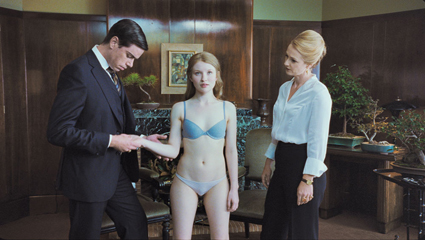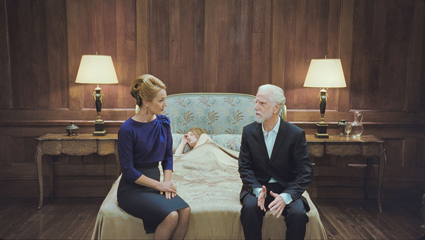 |
Eden Falk, Emily Browning and Rachael Blake, Sleeping Beauty |
The somnambulist of the title is Lucy (Emily Browning), a 20-something university student. Juggling various casual jobs as a waitress, photocopy clerk and participant in medical experiments, she breaks up her brittle routine by picking up businessmen in bars or visiting her bookish friend Birdmann (Ewen Leslie), an alcoholic misfit with whom she shares some measure of platonic intimacy, the pair united in mocking a comfortable middle class existence from which they seem excluded.
Behind in the rent in her shared house, Lucy answers an advertisement for a position requiring “mutual trust and discretion” from Clara, an imperiously coiffed madam (Rachael Blake). Initially, wearing little but her knickers, she is required to provide silver service to three extremely wealthy old men (Peter Carroll, Chris Haywood and Hugh Keays-Byrne), but is soon offered a ‘promotion’: to lie naked in a drugged sleep while each man does what he will with her. Lucy glibly accepts, blithely asserting that “my vagina is not a temple” to Clara’s oddly prudish assurances that no sex will ensue.
Leigh has said that she strove to create a “tip of the iceberg” feel to the film and indeed, at times it seems to consist entirely of immaculately gleaming surface. Shot in Sydney, the film is bereft of any clear indicators of place, what action there is unfolding within anonymous public spaces or bland, depersonalised private ones. Although many scenes are inflected with unmistakably local touches, for all intents and purposes it could be set anywhere in the western world, Leigh striving to hit an allegorical note unmoored from historical reality.
The script draws heavily from literary touchstones, the tender but impotent nostalgia of the first old man self-consciously echoing Gabriel Garcia Marquez’ Memories of My Melancholy Whores and Yasunari Kawabata’s House of the Sleeping Beauties, both cited by Leigh as important influences. However, her heroine’s determined complicity also recalls Angela Carter’s supernatural version of the tale "The Lady of the House of Love." Like Carter’s vampiric protagonist, Lucy is wilfully passive, “indifferent to her own weird authority, as if she were dreaming.” In this sense she might be considered what Carter referred to as a “Sadeian Woman,” Leigh using her character’s self-destructiveness as a means of tracing the logic of sexual and economic exploitation. It’s hardly accidental that once she obtains her first payment Lucy burns the money.
 |
Rachael Blake, Emily Browning and Peter Carroll, Sleeping Beauty |
Leigh’s penchant for immaculately composed shots, held well beyond the requirements of narrative, conjures a mood of brooding watchfulness reminiscent of Michael Haneke’s brilliant Hidden (RT75). In that film the director meticulously crafted an air of patient stillness, the implacable, unseen camera reversing the historical power dynamic of French colonialism with eventually devastating results. Sleeping Beauty is similarly deliberate, the camera being as unwavering on the withered bodies of the men as on Browning’s naked form. Although it may be at times uncomfortable to watch, Leigh seems willing to only go so far—her depiction of the sole instance of outright physical abuse (a cigarette burn) is constructed to obscure what it simultaneously depicts, an approach characteristic of the rest.
It may be because of this that Sleeping Beauty frustrates. The enigmatic aura that Julia Leigh carefully nurtures is both painfully affected and needlessly obscure, squandering an intriguing scenario by lapsing into cryptic torpor. Worse, at the screening I attended, a number of moments weighted with an otherwise overbearing seriousness elicited, presumably unintended, laughter. Although not without its pleasures—the performances, particularly that of Browning, are excellent—it is difficult to be seduced by Sleeping Beauty, the film aiming to make a much greater impact than it seems capable of delivering.
Sleeping Beauty, writer-director Julia Leigh, actors Emily Browning, Rachael Blake, Ewen Leslie, Peter Carroll, Chris Haywood, Hugh Keays-Byrne, cinematographer Geoffrey Simpson, editor Nick Meyers, production design Annie Beauchamp, sound design Sam Petty, composer Ben Frost; Magic Films, 2011; www.sleepingbeautyfilm.com/
RealTime issue #103 June-July 2011 pg. web
© Oliver Downes; for permission to reproduce apply to [email protected]








 back
back